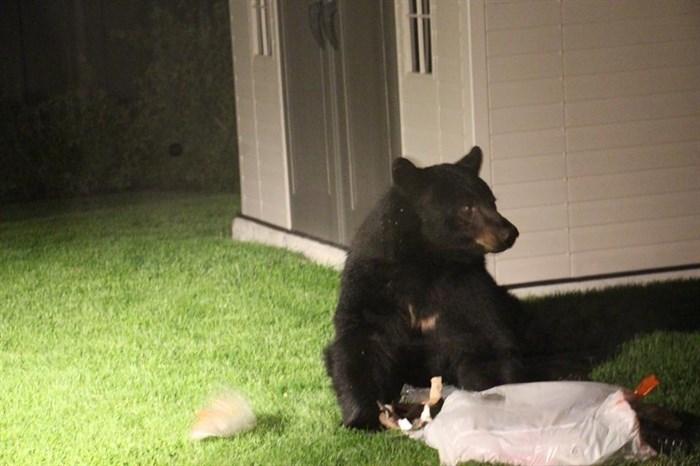
File Photo.
Image Credit: Venkat Geebu
August 20, 2016 - 1:00 PM
VERNON - You may have heard the saying ‘a fed bear is a dead bear’ and in the North Okanagan, that fate was true for approximately 15 animals over the past several months.
Conservation officer Ken Owens says most, if not all, of the 15 bears put down since April in the North Okanagan zone (which includes Kelowna, Lake Country, Vernon, Enderby, Salmon Arm and Malakwa) had grown habituated to eating garbage and other food left out by people.
“We have really been trying to get the message out with cities, regional districts, resorts, campgrounds, hotels, and private residents, deal with your attractants because you are killing bears,” Owens says. “We’re getting some good buy-in, but the reality is so many North Okanagan communities are not bear aware.”
With fruit ripening on trees and salmon spawning in rivers, Owens says bear complaints are escalating in the North Okanagan right now and he’s reminding people that reducing or eliminating attractants can directly prevent bears from being killed.
“It’s so sad when we do what we have to do when it gets bad and public safety is in jeopardy,” Owens says.
Once bears are habituated to eating garbage, the behaviour is ingrained and they are not good candidates for relocation because they will simply keep seeking out garbage. As the conservation service says, it’s best for wildlife to stay wild — for them, and us.
“We had some pretty serious incidents in Kelowna this summer where bears were breaking into vehicles and breaking into homes,” Owens says, adding they were, once again, attracted by garbage. “So much of it could have been prevented.”
Fed black bears will also eat garbage including bottle caps, glass, aluminum foil, and other items that can be harmful to their mouth, throat, and digestive system, Owens says.
People caught attracting dangerous wildlife with food, either intentionally or inadvertently, are liable for fines starting at $230. The conservation service has also been handing out a number of dangerous wildlife protection orders — warnings for people or businesses to better handle their garbage or other attractants within a set amount of time.
Residents are encouraged to pick ripe fruit off their trees, and to consider installing electric fencing to deter bears from getting in. Bear-resistant garbage containers are another option available for people.
“We’ve got all the tools in the toolbox to be successful,” Owens says. “We just need everybody working together, from cities, to regional districts to residents.”
From the Conservation Officer Service:
If you have bear attractants around your house, worksite or campsite you can keep your family safe and keep bears from being destroyed. There are a number of things you can do:
1. Keep all garbage securely stored until collection day. Attractants should be stored in approved bear-resistant trash receptacles, or in sturdy buildings or places. Use bear resistant refuse containers community-wide.
2. Manage your fruit trees and berry bushes responsibly. Pick ripe and fallen fruit daily. Remove unused fruit trees, use electric fencing.
3. Bird feeders often become bear-feeders, so please, only feed birds during the winter months. Take feeders down between April and November. Keep ground free of seeds.
4. Manage your compost properly, turn it regularly and keep it covered.
5. Vegetable gardens, compost piles, orchards, beehives, chickens or small livestock may attract bears. Use a properly installed and maintained electric fence. Store all of your feed in a secure location and ensure feeding areas are clean and free of attractants.
For wildlife conflict issues, contact the Conservation Officer Service at Report All Polluters and Poachers: RAPP 1-877-952-7277.
To contact a reporter for this story, email Charlotte Helston or call 250-309-5230 or email the editor. You can also submit photos, videos or news tips to the newsroom and be entered to win a monthly prize draw.
We welcome your comments and opinions on our stories but play nice. We won't censor or delete comments unless they contain off-topic statements or links, unnecessary vulgarity, false facts, spam or obviously fake profiles. If you have any concerns about what you see in comments, email the editor in the link above.
News from © iNFOnews, 2016